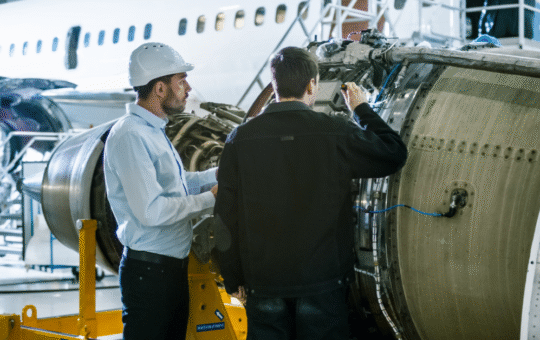Expert

Level 6 Diploma in Air Transport Management and Strategy
Level 6 Diploma in Air Transport Management and StrategyCourse OverviewThe Level 6 Diploma in Air Transport Management and Strategy is designed to equip learners with advanced knowledge and skills in managing and strategically leading air transport organizations. This course covers all critical aspects of air transport management, including operations, finance, marketing, regulatory frameworks, and strategic planning. Learners will gain a deep understanding of the complexities of the air transport industry, including airline and airport management, logistics, sustainability, and risk management. The qualification prepares students for senior managerial or strategic roles within the aviation sector.Benefits
- Gain comprehensive knowledge of air transport management, including strategic decision-making and operational efficiency.
- Learn to navigate complex regulatory frameworks and understand the global aviation industry landscape.
- Develop expertise in strategic planning, sustainability, and the financial management of airlines and airports.
- Build skills in managing air transport organizations, from passenger service operations to logistics and cargo.
- Prepare for leadership roles in aviation, airline management, or air transport consulting.
- Apply strategic management principles to air transport organizations.
- Analyze and interpret the regulatory frameworks governing the aviation industry.
- Develop and implement operational strategies to optimize airline and airport management.
- Assess financial performance, cost structures, and revenue management in air transport organizations.
- Manage key functions such as marketing, passenger services, and cargo operations.
- Understand and apply sustainability practices in air transport operations.
- Lead air transport organizations through strategic transformations, market challenges, and industry disruptions.
- Introduction to Air Transport Management
- Overview of the air transport industry: airlines, airports, regulatory bodies
- Key players in air transport: airlines, cargo companies, ground services, regulators
- Trends in global aviation and the future of air transport
- Airline Operations Management
- Airline management and operational frameworks
- Fleet management, crew scheduling, and route planning
- Passenger services, check-in, boarding, and on-board services
- Efficiency in airline operations and cost management
- Airport Management and Operations
- Key functions of airport management: ground operations, security, check-in services
- Managing passenger flow, baggage handling, and flight operations
- Airport design, capacity management, and expansion planning
- Regulatory requirements for airport safety, security, and operations
- Strategic Planning and Decision-Making in Air Transport
- Strategic management principles in the aviation industry
- Market analysis, competitive strategy, and forecasting
- Risk management, crisis response, and strategic leadership in aviation
- Developing long-term growth strategies for airlines and airports
- Aviation Finance and Revenue Management
- Key financial principles in aviation: budgeting, cost structures, and financial performance
- Revenue management in airlines: pricing strategies, demand forecasting, and seat optimization
- Financial performance analysis and cost control strategies
- Managing financial risk in aviation operations
- Aviation Marketing and Customer Service Management
- Marketing principles for airlines and airports: branding, advertising, and customer loyalty
- Enhancing the passenger experience and improving customer service delivery
- Digital transformation in air transport marketing and customer engagement
- Managing public relations and crisis communications in the aviation industry
- Regulatory and Legal Frameworks in Air Transport
- International regulations governing air transport: ICAO, IATA, FAA, and EASA
- Safety standards and compliance in airline and airport operations
- Air transport agreements, environmental regulations, and aviation law
- Legal frameworks for aviation safety, security, and dispute resolution
- Sustainability and Environmental Practices in Air Transport
- Sustainability challenges in the air transport industry: carbon emissions, noise, and pollution
- Green aviation practices and sustainable technologies (e.g., electric planes, biofuels)
- Implementing environmental policies and sustainability reporting
- Balancing profitability with environmental responsibility in aviation
- Cargo and Logistics Management in Air Transport
- The role of air cargo in global logistics and supply chains
- Managing cargo operations: customs, freight, and packaging
- Optimizing cargo capacity and integrating logistics into overall air transport strategy
- Regulations and safety standards for air cargo operations
- Leadership and Human Resource Management in Air Transport
- Leadership and management practices in aviation organizations
- Workforce planning, training, and development in airline and airport operations
- Managing cross-functional teams in a complex, global industry
- Fostering innovation and maintaining high employee morale in the aviation sector
- Airline managers, airport operations managers, and senior professionals in air transport
- Individuals aiming for leadership roles in aviation strategy, operations, and management
- Professionals with a background in aviation or business management looking to advance in air transport leadership
- Consultants, regulators, and legal professionals in the aviation industry
- Those aspiring to take on high-level roles in airport and airline management
- Airline Operations Manager, Airport General Manager, or Head of Aviation Strategy
- Air Transport Consultant, Regulatory Affairs Manager, or Aviation Policy Advisor
- Cargo and Logistics Manager, Revenue Management Analyst, or Fleet Planning Manager
- Leadership roles in governmental aviation bodies or international organizations (ICAO, IATA, etc.)
- Further progression to Level 7 Diplomas in Strategic Leadership, Aviation Management, or Global Aviation Operations
- Comprehensive Coverage: This diploma covers all facets of air transport management, from operations and strategy to finance and sustainability.
- Industry-Relevant Skills: Learners gain practical and strategic skills that are highly valued in the global aviation industry.
- Global Recognition: Aligns with international standards and prepares learners for leadership roles in a global aviation context.
- Career-Focused: Ideal for professionals seeking to enhance their career prospects in aviation management and strategy.
Qualification Title: Level 6 Diploma in Air Transport Management and Strategy
Level: 6
Type: Diploma
Total Qualification Time (TQT): 600 hours
Guided Learning Hours (GLH): 360 hours
Credit Value: 60 credits
Assessment Method: Assignment-based
Grading: Pass/Merit/Distinction
Delivery Mode: Blended (Online & Classroom)
Study Units Breakdown
| Unit Title | GLH | TQT | Credit | Assessment Type |
|---|---|---|---|---|
| Introduction to Air Transport Management | 36 | 60 | 6 | Assignment-Based |
| Airline Operations Management | 36 | 60 | 6 | Assignment-Based |
| Airport Management and Operations | 36 | 60 | 6 | Assignment-Based |
| Strategic Planning and Decision-Making in Air Transport | 36 | 60 | 6 | Assignment-Based |
| Aviation Finance and Revenue Management | 36 | 60 | 6 | Assignment-Based |
| Aviation Marketing and Customer Service Management | 36 | 60 | 6 | Assignment-Based |
| Regulatory and Legal Frameworks in Air Transport | 36 | 60 | 6 | Assignment-Based |
| Sustainability and Environmental Practices | 36 | 60 | 6 | Assignment-Based |
| Cargo and Logistics Management in Air Transport | 36 | 60 | 6 | Assignment-Based |
| Leadership and HR Management in Air Transport | 36 | 60 | 6 | Assignment-Based |
Upon completing this diploma, learners will be able to:
- Apply strategic management principles to air transport organizations.
- Analyze and interpret the regulatory frameworks governing the aviation industry.
- Develop and implement operational strategies to optimize airline and airport management.
- Assess financial performance, cost structures, and revenue management in air transport organizations.
- Manage key functions such as marketing, passenger services, and cargo operations.
- Understand and apply sustainability practices in air transport operations.
- Lead air transport organizations through strategic transformations, market challenges, and industry disruptions.
This diploma is ideal for:
- Airline managers, airport operations managers, and senior professionals in air transport
- Individuals aiming for leadership roles in aviation strategy, operations, and management
- Professionals with a background in aviation or business management looking to advance in air transport leadership
- Consultants, regulators, and legal professionals in the aviation industry
- Those aspiring to take on high-level roles in airport and airline management
Assignment-Based
Top Courses
Related Courses
Let's Get in touch
Deleting Course Review
Are you sure? You can't restore this back
Course Access
This course is password protected. To access it please enter your password below:



